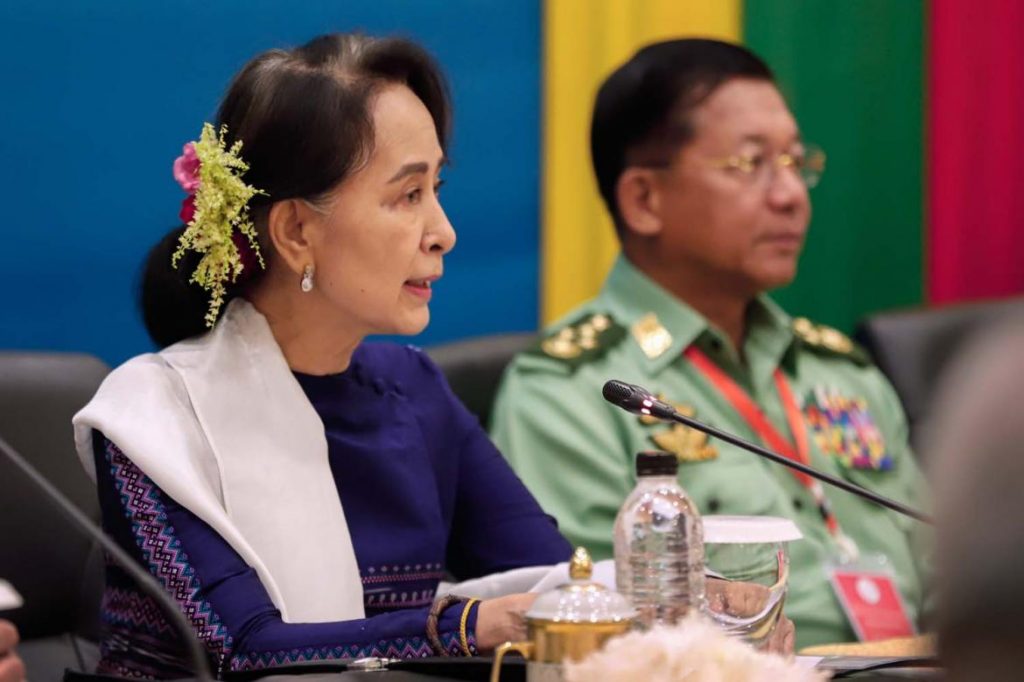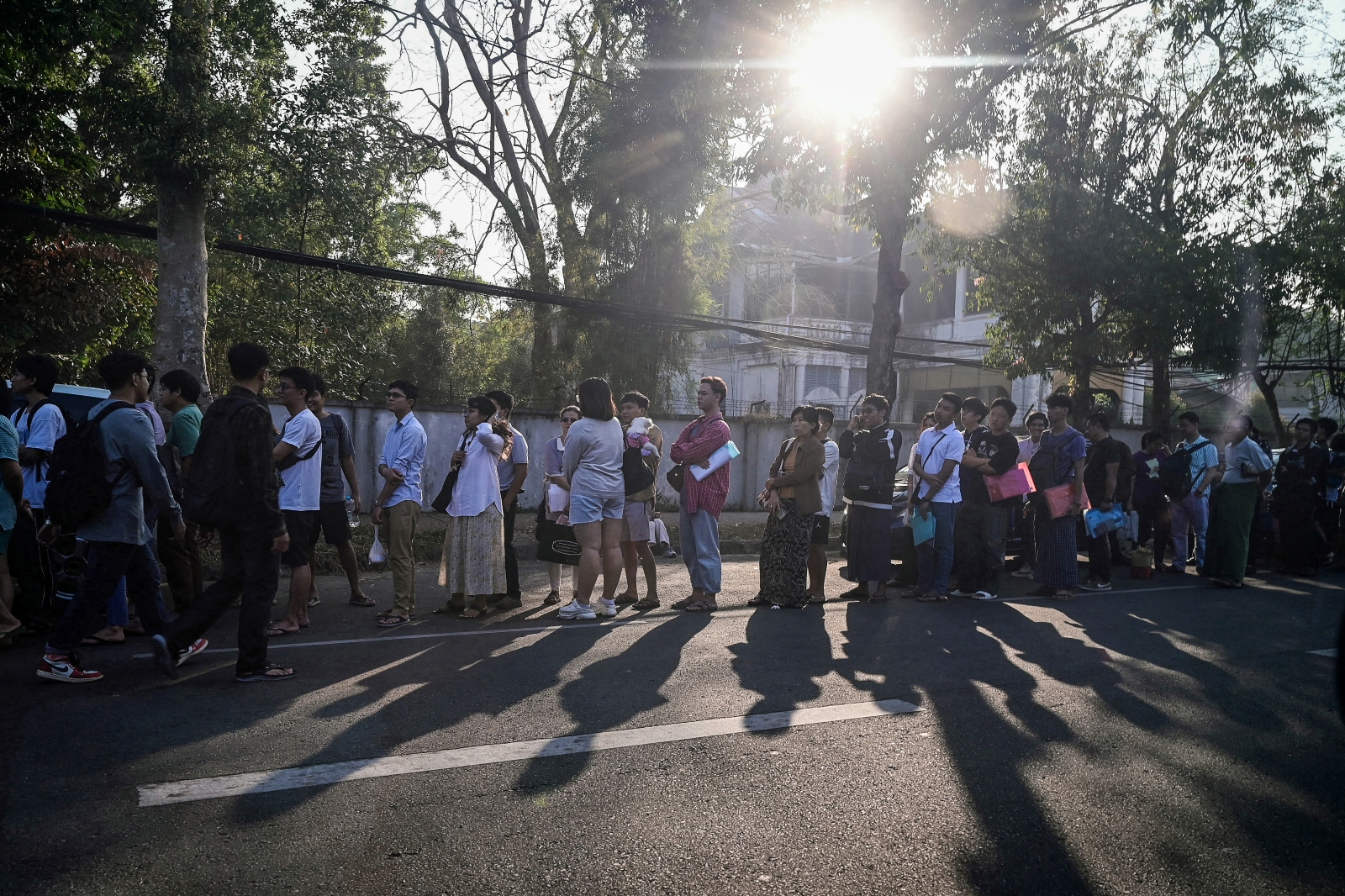The NLD’s push for constitutional change is likely to result in a vote in parliament in the coming weeks or months. It will almost certainly end in defeat, but could give the party a helpful election boost.
By LUN MIN MANG | FRONTIER
The success of the National League for Democracy’s latest effort to amend the constitution will be decided at the next sitting of the national legislature, scheduled to begin on January 27.
NLD sources told Frontier that it’s unclear how long the process will take, but there could potentially be a lengthy debate before they get the chance to vote on the amendments.
Observers believe though that the push, which focuses on reducing the military’s political rule, has little chance of succeeding, with both military and Union Solidarity and Development Party MPs likely to vote against the proposed changes. The military holds an effective veto over constitutional change due to its 25 percent bloc of lawmakers, and the requirement that any changes have the support of more than 75pc of MPs.
Many have described the charter change push as a political stunt, designed purely so that the NLD can show voters that it tried to fulfil one of its key promises from the 2015 election campaign.
Support more independent journalism like this. Sign up to be a Frontier member.
Regardless of the outcome, the vote on the constitutional amendment bills will conclude a year-long process that got underway on January 29, 2019, the anniversary of the assassination of the NLD’s legal adviser U Ko Ni, who was a strong advocate for constitutional reform.
Shortly after the party announced its plans, the NLD-controlled Pyidaungsu Hluttaw formed a 45-member committee and tasked it with drawing up bills to amend the charter.
The committee finally finished reviewing around 3,700 recommendations from political parties on January 13, and at the time of writing was drawing up two bills for submission to the Pyidaungsu Hluttaw.
After receiving the bills, Pyidaungsu Hluttaw Speaker U T Khun Myat will forward them to the Joint Bill Committee – comprising the bill committees of the upper and lower houses – for scrutiny, after which they will be submitted for discussion and a vote in the chamber. Sources told Frontier that the debate is expected to start as early as February.
The first amendment bill will include sections of the charter that must be changed in line with section 436(a), which states that amendments need both the backing of more than 75pc of lawmakers and more than half of total eligible voters at a national referendum.
The second bill will include sections of the constitution that can be amended through a vote in parliament only.
An NLD lawmaker familiar with the committee’s tasks said that the two bills will include amendments to more than 100 sections of the constitution.
Some of the changes are relatively minor, such as amending word usage. As an example, the NLD lawmaker cited a proposal to substitute the Myanmar word for “disabled person” from ma than ma swan to ma than swan, a usage that has been adopted by government in recent years at the suggestion of civil society.
The party is also pushing to amend section 59(f), which is widely referred to as the Daw Aung San Suu Kyi clause, because it bars anyone with a foreign spouse or children from the presidency, to enable the NLD leader to become president.
But the NLD’s key proposals are for the military’s role in politics to diminish over time through a gradual withdrawal of Tatmadaw lawmakers in the country’s parliaments. The party wants the military block to be cut to 15pc of MPs for the 2021-26 parliamentary term, 10pc in 2026-31 and 5pc in 2031-36, before the military withdraws altogether.
It also wants to change the way the constitution is amended, by reducing the threshold to two-thirds of lawmakers and a simple majority at a referendum.
“At first we tried to work within the current system but based on our experience in these past few years we’ve come to realise that a real democratic transition will only be possible after amending the constitution,” said U Aung Kyi Nyunt, a senior NLD lawmaker from the Amyoth Hluttaw (Magway-4) who also sits on the constitution committee.
Heated debates
But the NLD push has been divisive, further damaging its already fraught relations with the Tatmadaw and even frustrating some of the major ethnic minority parties.
The USDP and military have countered the NLD push with five amendment bills of their own, some of which would appear to increase the military’s political power.
One bill proposes changing the constitution in a way that would potentially grant the military authority to dismantle parliament under certain circumstances – a move critics say could undermine democracy.
Another bill would apply the criteria in clause 59(f) to other senior government positions, including chief ministers of states and regions.
After the bills were proposed, the legislature decided to forward them to the NLD-dominated charter reform committee for integration into the main bills, a move that angered military and USDP lawmakers.
The decision to send them to the committee resulted in heated debates in the chamber through November and December, with USDP and military representatives using unusually strong language to express the level and intensity of their frustration at the decision. NLD lawmakers responded in kind, putting forward a range of arguments to justify the decision. The angry exchanged prompted speaker U T Khun Myat to issue warnings to several USDP and military MPs, as well as a few NLD lawmakers.
These debates put T Khun Myat in an awkward position. A former member of the USDP who was evicted from the party along with former speaker U Shwe Mann, he is officially an independent. But his handling of the debates prompted some USDP and military lawmakers to label him a “political tool” of the NLD. In one case, a military representative also accused him of ignoring parliamentary rules. Unsurprisingly, the NLD was also accused of using the charter amendment to win votes in this year’s election.
Increasingly frustrated USDP lawmakers resigned from the 45-member charter change committee. In doing so, they echoed the complaints of Arakan National Party lawmakers and an independent MP who already resigned in September last year on the grounds they had not been treated fairly. The military also sent a letter in December to the speaker, expressing frustration at what it described as the NLD’s “tyranny” in running the constitution amendment committee. One of the reasons it cited was that the committee spent only five minutes debating each of the proposed changes.
However, the NLD has been unable to block the USDP and military bills because under section 435 if 20pc of Pyidaungsu Hluttaw representatives sponsor an amendment bill it must be “considered” by the parliament.
As a result, lawmakers are likely to vote on the five bills – three from the USDP and two from the military – alongside the amendment committee’s two bills.
Little hope for success
The clear military and USDP opposition to both the substance of the NLD’s constitutional amendments as well as the process the party has used mean the proposed changes are almost certainly doomed to fail.
“Because of section 436 I don’t see how the amendment process can move forward,” said Amyotha Hluttaw representative Pu Gin Kam Lian (Zomi Congress for Democracy, Chin-5). “It’s going to lead to a deadlock and the process is likely to come to a halt. The NLD cannot simply go beyond the provisions of section 436.”
With the current parliamentary process likely to fail due to a lack of support from the military, the only possible alternative seems to be a high-level meeting between ruling party leader and State Counsellor Aung San Suu Kyi and Commander-in-Chief Senior General Min Aung Hlaing.
Frontier contacted several senior NLD members to ask about the possibility of such a meeting, but they declined to comment.
“It is obvious that we are not going to be successful unless the military agrees to amend the constitution,” said Aung Kyi Nyunt from the NLD. “We’ll know when the vote takes place in parliament which parts of the constitution the military will keep holding on to.”
Ethnic political parties appear caught between the NLD on one side, and the USDP and military on the other. While many of them are in favour of reducing the military’s political power in general, they are also upset that the NLD is not pushing for any federalism-related changes.
Instead, it is the USDP that has proposed amending section 261, which gives the president the authority to nominate the chief minister of a state or region, rather than the state or region legislature.
Leading ethnic parties, such as the Shan Nationalities League for Democracy and Arakan National Party, also submitted similar proposals to amend section 261 to the charter reform committee.
This amendment appears to also have military support – the USDP was only able to submit its bills with the support of the Tatmadaw bloc, as it does not control 20pc of seats.
An amendment to section 261 could therefore be approved – if the NLD also agreed to the change. But Aung Kyi Nyunt said that as long as the military remains involved in politics the NLD will not support amending section 261 to give state and region legislatures the power to choose their chief ministers.
He hinted that doing so could give the military the opportunity to win power at the sub-national level through coalition-building, and undermine the activities of the national government.
“Is there genuine democracy with 25 percent of military personnel sitting in the parliament? In these circumstances, you can imagine what scenario will appear in the legislatures of states and regions,” he said.
If the NLD fails to amend the constitution – as appears likely – its attempt is still expected to give it a boost in this year’s election, at least in majority Bamar areas. Some speculate that the entire process has been, effectively, part of the NLD’s re-election strategy.
One NLD lawmaker, who asked not to be named, said ruling party representatives anticipate the amendments will fail.
“If it fails, we can say, ‘Look, we tried to amend the charter to make it more democratic. But the military blocked it. That’s why it failed.’ What else can we say other than that?”







